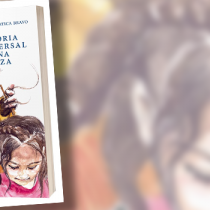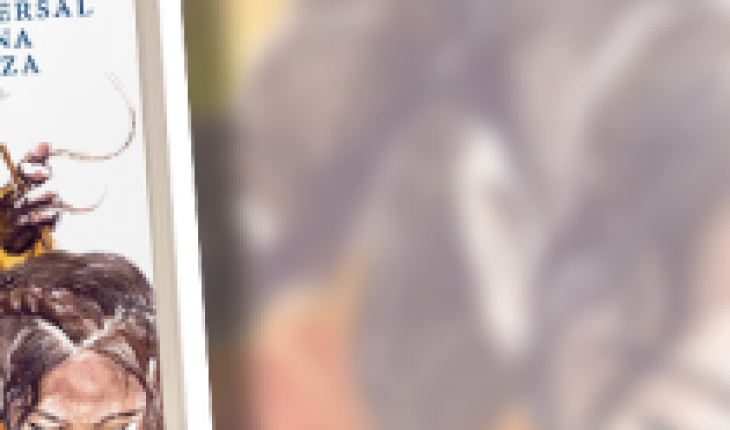
“We owe those who preceded us a part of who we are. The duty of memory is not limited to keeping the material, writing or other footprint of past events, but cultivates the feeling of being bound towards these others of which we will later claim that they are gone but that they were,” Paul Ricoeur.
Marcelo Gatica Bravo (born 1976) is a writer, professor of Spanish and PhD in Avant-Garde and Postvanguardia Literature in Spain and Latin America from the University of Salamanca. In poetry he has published The sea is no longer (2020), The outside wall/ Vajaspoolmére (2018), Anchored to the sea fisherman (2017), Crucial (2015), Portfolio: poems at the foot of the page (2014). In Estonia it has coordinated two anthologies, under the title Southern Winds: Chilean Poetry / Luunatuuled:T’iililuule (2015 and 2018).
Universal history of a braid (RIL Editores, 2020) is a poem divided into five parts that is rooted in family memory, a story that is transmitted from generation to generation, of grandmothers, mothers, aunts, daughters or sisters, where weaving and cutting the braid, as Gatica recognizes, makes evaporate “the prison of the body”, “cut and give birth a dawn breaking the earth, tattooing my footprints”.
The footprints perhaps as a syncdoque of the body, as an inescapable indication of the passage of time. Because “I’m a bodily self, ” Freud said. “Because the body matters, ” as Judith Butler assures us. And braids see the existence, the memories, an indispensable learning about the earth, rain, nature, everyday life, magic. Cauquenes. The south. The act of counting through braid constitutes a genealogy, a constellation, in the words of Walter Benjamin, that is the case and multiplies without linearity as a mark or closure.
Writer Marcelo Gatica
“Things aren’t what they seem. Daughter, the wind, perfectly an angel in full birth. Listen to his white silence” (p. 16).
“Grandma read the tides of the winds. / He knew his story/his air path/the spirit of footsteps/the silent itinerary of the windows” (p. 61).
“On the least thoughtful day you opened the door of the ocean/ that mysterious sea/ that everything is s zamping” (p. 76).
“The hours slide over the skin on the body. I move instantly from the roar” (p. 24).
Braid involves a certain twist, a spiral of hair that is but the spiral of life. Mystery. In these verses full of lyricism there is mystery, because the word is sinuous and flirts between concealing and deciphering. Something that gets tangled up, something that stays in the shadows, something that flirts with silence. Ungraspable. As Irma Césped, Master of Medieval Literature, acknowledges, “it seems that the mystery of the word not said would have been twisted into the infinite spiral of hair that hides pain.”
“(…) And under genealogy/ braid is anchored/ as memory/ as a window/ as a vane of spirits/ an ocean magma/ that refreshes the skin/ to take/ the next passage of water” (p. 84).
“(…) Between the walls of a calligraphy notebook, I was futilely trying to get words out of bounds” (p. 23).
“But what does it make if the word had been said? Perhaps the word is not wind, spirit without direction. In your case, you kept the vital breath. All that the word would not be said” (p. 28).
There is some pulsion that reminds us of Clarice Lispector, that is, language as playful polish, closer to wonder and discovery, than to grammar and syntax. A language that refuses to be discourse and that is pregnant in the intelligability of children’s territories.
“There is so much distance between words and things, that inaccurate universe between the room and the orchard. After the time of the seams we set out to discover the plant language. We touched the words (I mean, the liquid skin of the flowers). With your cosmic silence, for example, we translated photosynthesis, the solar language of plants and herbs. Between the orchard and the door of your room we caught the pulse of the water, the root of light, the Aboriginal tongue of the mud, the footprint of the days: that time when we spoke to the trees” (p. 25).
The book, which transits between verse and poetic prose, and which counts on its cover with the participation of Izak one, artist cEstonian-based yarn, also contributes from a gender reading. Here the author is double aware: on the one hand, of the importance of women in the construction of their own biography; and on the other hand, of the visibility of an entire era, read, of grandmothers and mothers subjected to patriarchal order.
“It was the remote time of women under the skin of objects: woman chair woman cup woman give me the knife woman warms the bed” (p. 17).
“For years you were baptized the Muda. You buried the words in the bottom of your body. It was the tactic of forgetting the mutilation of your womb” (p. 20).
“The horizon/ in this village/ is square/and flat/geometrically/reverse for women” (p. 79).
But let’s go back to memory to finish. Universal history of a braid reiterates what Paul Ricoeur calls the duty of memory, on an ethical and political level, that is, more precisely, memory and its relationship to the duty of justice. “The duty of remembrance is the duty to do justice, through remembrance, to another other than one.” This means that memory is alterity, which is only made possible in the encounter with each other. A debt, of course. A debt to those who were and are no longer there. In short, a project against oblivion. An imperative for the future.
Marcelo Gatica. Universal history of a braid. RIL Editors, 2020. 86 pages.
The content poured into this opinion column is the sole responsibility of its author, and does not necessarily reflect the editorial line or position of El Mostrador.





